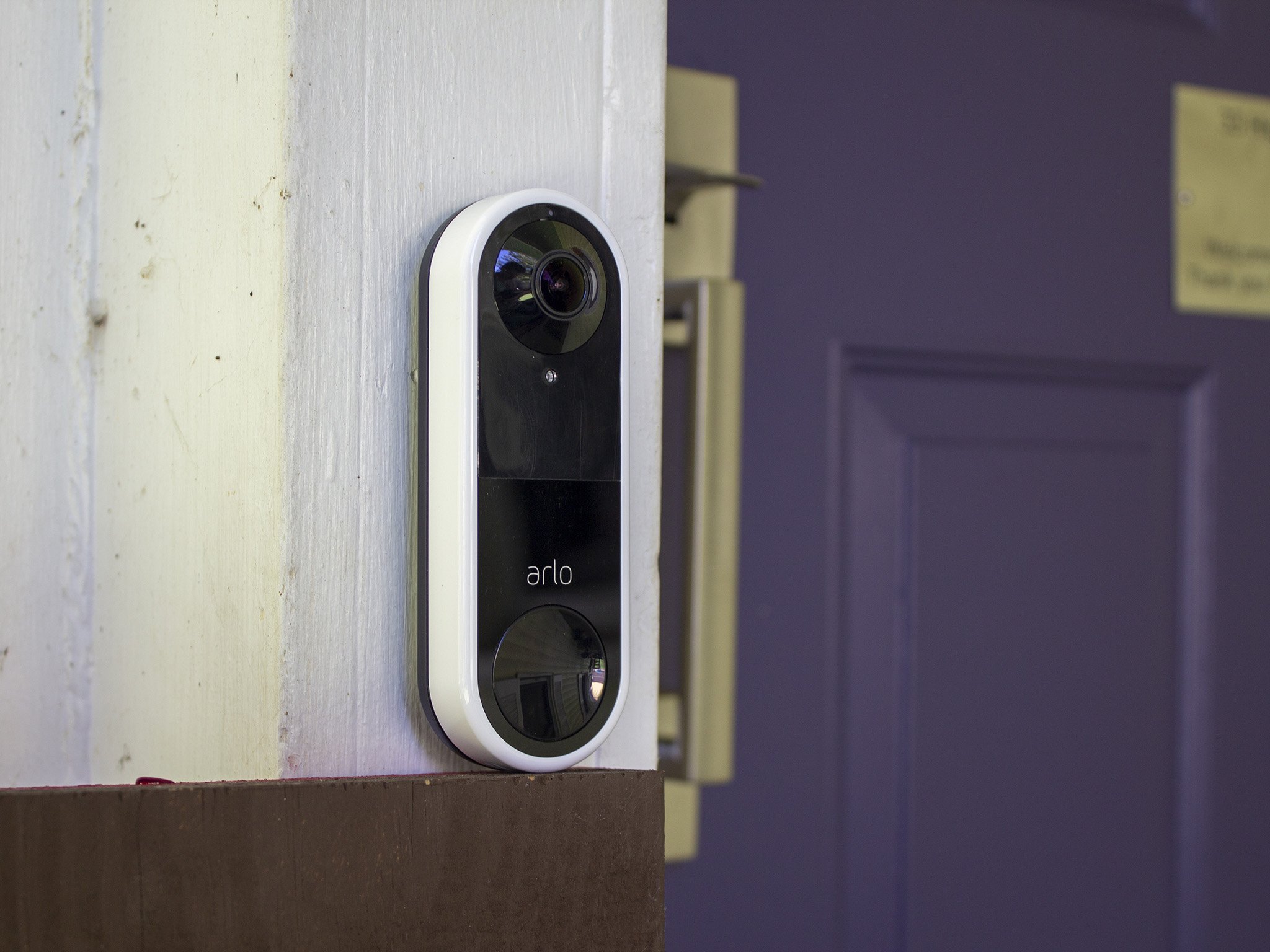Android Central Verdict
Bottom line: If you've already got an old-school wired doorbell by your front door, Arlo Video Doorbell is the best video doorbell you can buy. For less money than the competition, you're getting better hardware. Even the monthly subscription cost is less than its nearest competitor, all while offering near-identical features.
Pros
- +
2K HDR video
- +
180-degree FoV
- +
1:1 aspect ratio works better
- +
Built-in siren
- +
AI-powered object identification
- +
Supports almost all virtual assistants
Cons
- -
No battery operation
- -
Local storage requires base station (sold separately)
- -
No official Apple HomeKit support
Why you can trust Android Central
Arlo took some time to get its first video doorbell to market, but the Arlo Video Doorbell was well worth the wait. For quite a few years now, Nest has ruled the roost when it comes to wired video doorbells by not only offering better hardware than most other vendors but by packing in a level of smarts into its subscription plan that most companies could only hope to emulate.
Arlo's efforts are similar to Nest's: deliver top-tier hardware with unique features and bundle it with a subscription plan that puts it over the top. The difference? The Arlo Video Doorbell is 35% cheaper than the Nest Hello Video Doorbell. On top of that, the subscription cost for a single camera is half of what Nest charges — $3 per month for Arlo Smart versus $6 for Nest Aware. Both offer cloud storage and advanced AI-powered detection options, and neither offers local storage options, so a cloud subscription is basically a requirement for regular operation.
Also similar to Nest Hello is the inability to run on battery power — Arlo Video Doorbell must be hardwired to your home's electrical grid. Most of the time, this just means taking your old doorbell off the wall and screwing two wires into the Arlo Video Doorbell. In my case, I had to wire it to a friend's house because my home's doorbell wiring just doesn't work anymore. The Arlo Video Doorbell won't work for people like me, but Arlo does have a wireless version coming in the very near future.
Rethinking the solution
Arlo Video Doorbell: What I like
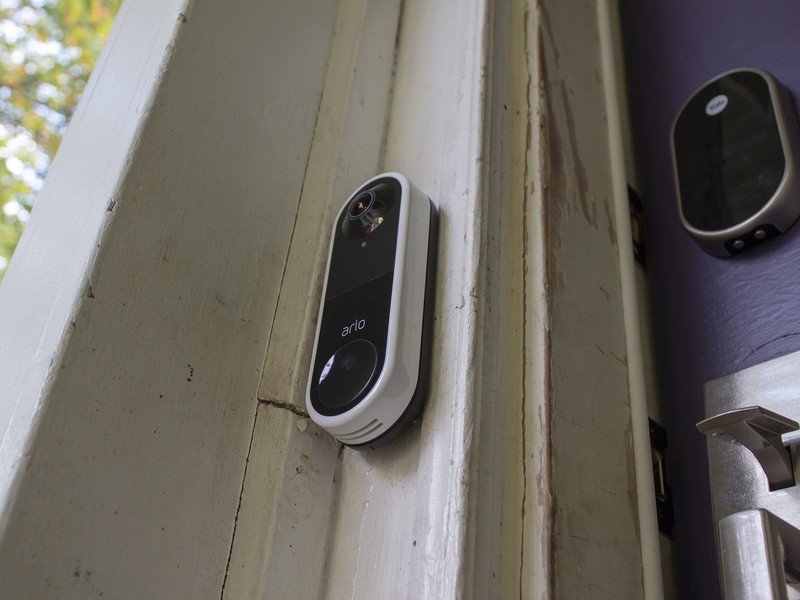
Many video doorbells have claimed the crown of "best image quality" throughout the years by using all the normal tricks. Higher-resolution cameras, HDR, infrared night vision, etc. Arlo utilizes all these great things but also does something very unexpected: it changed the aspect ratio. While most video doorbells stick with the tried-and-true 16:9 aspect ratio that we use for TV shows and movies, Arlo realized that this aspect ratio just isn't ideal for looking at what's happening on a normal front porch.
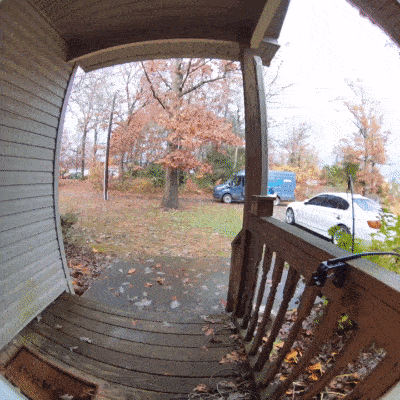
On top of an ultra-wide 180-degree field-of-view (FoV), Arlo's unique 1:1 aspect ratio actually makes it so you can see absolutely everything happening right where you want to. Top that off with crystal-clear 2K video that's not obstructed by super bright or dark areas (thanks to HDR), and you've got a custom-tailored camera that's perfectly suited for front-porch viewing at all times of the day. It's amazing what such a "simple" rethinking of the situation at hand will do!
Arlo's unique 1:1 aspect ratio actually makes it so you can see absolutely everything happening right where you want to.
On top of high-quality video, Arlo's object detection is second only to Nest's, and that's only because Arlo doesn't have a "familiar faces" feature as Nest does. For many people, though, this is likely a comforting "omission," as it means the cloud-side of things isn't keeping track of what someone looks like and trying to identify whether or not they should be there. Arlo can identify the difference between a person and a cat, as well as movement just caused by wind blowing, and that's likely more than enough for most people's comfort levels and needs.
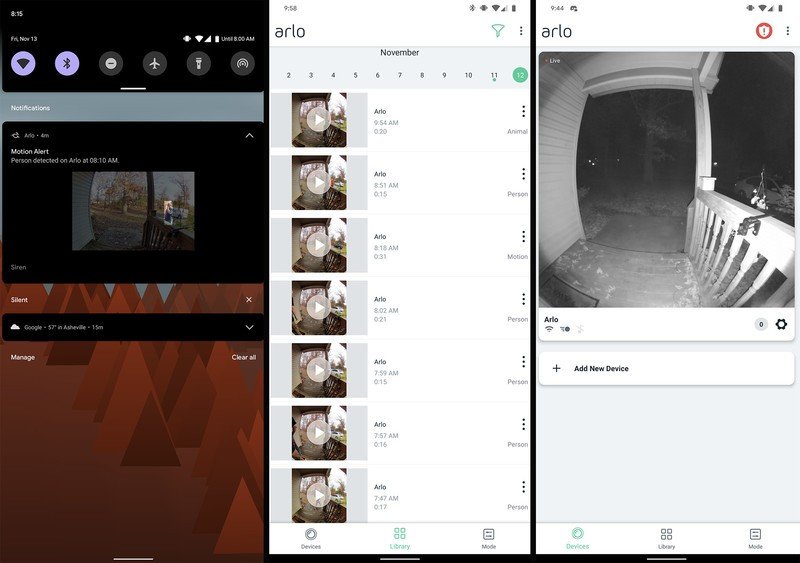
The Arlo app makes it ultra-easy to identify why a movement was detected with a simple denotation next to each event. Was it just regular movement, or was a person spotted? You can even choose to have non-person detection movement events filtered out, so you'll only receive a notification on your phone if a person was actually detected. It'll even highlight the person in the thumbnail on the notification, so you can swipe it away if it turns out to be nonsense.
You will, of course, need an Arlo Smart subscription to take advantage of these advanced identification features, which starts at $3 per month for a single camera. If you have multiple Arlo cameras throughout your home, this service will cover 5 of them for $10 per month, all with an app that lets you see all of them in one place. The app itself is incredibly well designed and super easy to use, including easy access to historical footage in a standard calendar format.
Arlo supports every assistant and smart home service you could possibly want to connect to it, as well. That's a far cry from many video doorbells, which often only support the service their company offers (Ring, Amazon, Google, etc.) or only support the best features through their own assistant.
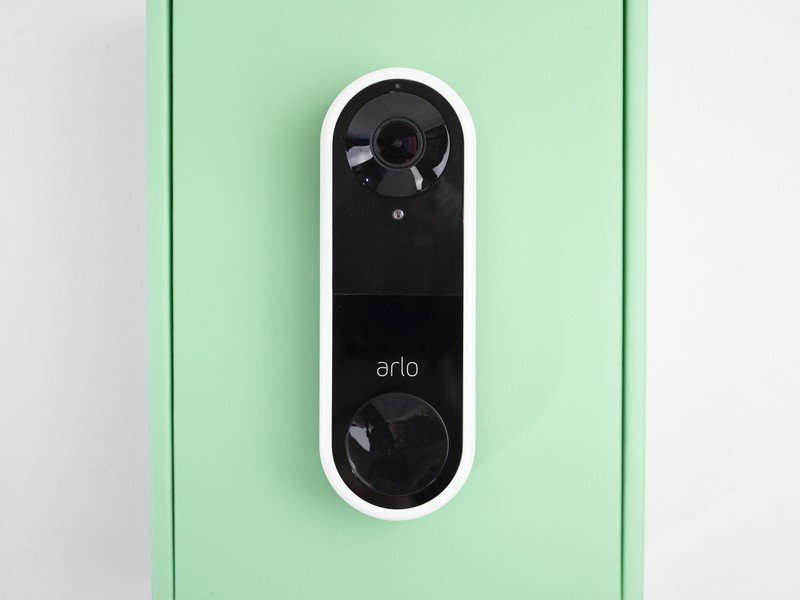
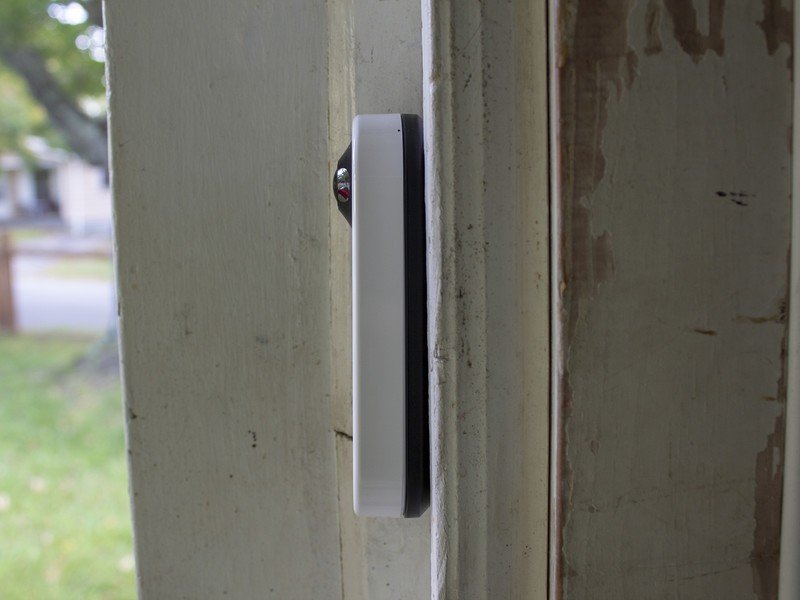
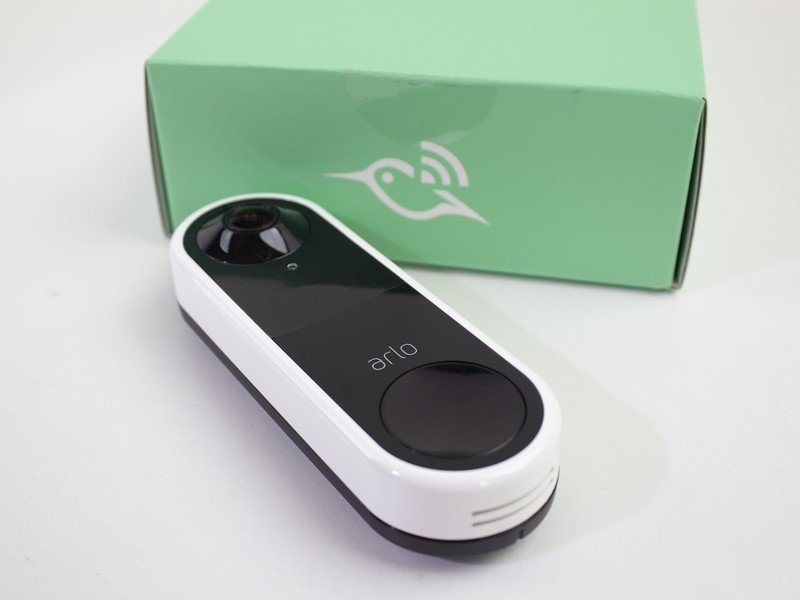
Setting up the smart home integration just takes a few button presses in the app, and hooking up the doorbell itself is quite easy, as well. That is, of course, provided that you already have a wired doorbell at your front door. Two little cables connect right into the marked spots, and then you just snap the doorbell into the frame that comes in the box. There's even a siren built into the video doorbell, so if you really need someone to go away fast, just tap the siren button in the app, and it'll start screeching like a banshee.
Little to improve
Arlo Video Doorbell: What I don't like
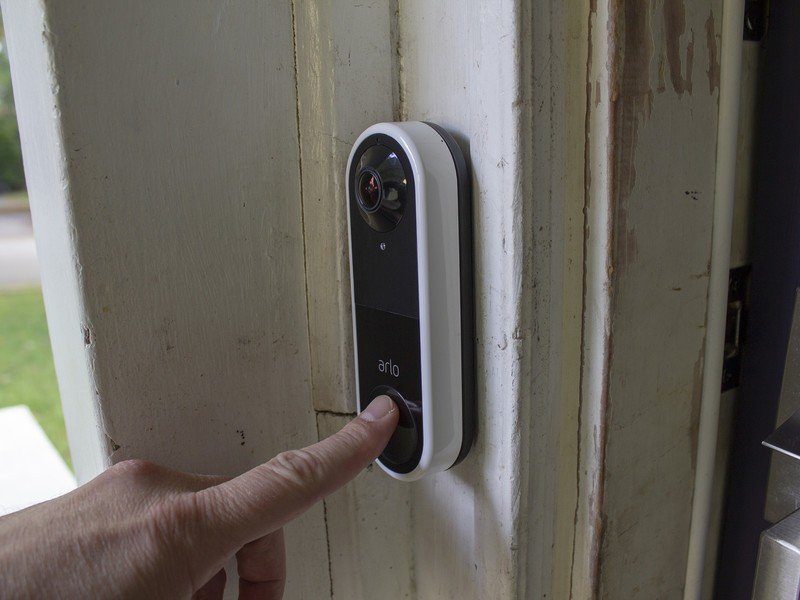
For me, there weren't too many areas that Arlo could improve, but the most obvious one was the lack of a battery-powered option. Sure, Arlo has a battery-powered video doorbell coming soon, but even a small battery on this one would have been great. The requirement to have wired power for the video doorbell also means that customers who can't wire the doorbell up will just have to wait for Arlo's battery-powered option to launch later in 2020.
subscription fatigue is a real thing these days, and it could be a deal-breaker for some folks
I also wasn't a huge fan of the fact that there's no local storage option natively with Arlo Video Doorbell unless you've already got an Arlo base station (or plan to buy one). That means you either have to shell out more up-front or else you'll need to subscribe to an Arlo Smart plan for at least $3 per month. In all honesty, it's probably not hard to find $3 per month to keep things going, but subscription fatigue is a real thing these days, and it could be a deal-breaker for some folks.

On top of that, all of the advanced object detection features are also only available if you've got an Arlo Smart subscription. Having features behind a paywall is never a great feeling when you've just purchased a product but, in Arlo's defense, the Arlo Video Doorbell is already the most affordable in its class, and almost all of its major competitors also require a cloud-based subscription for the same things.
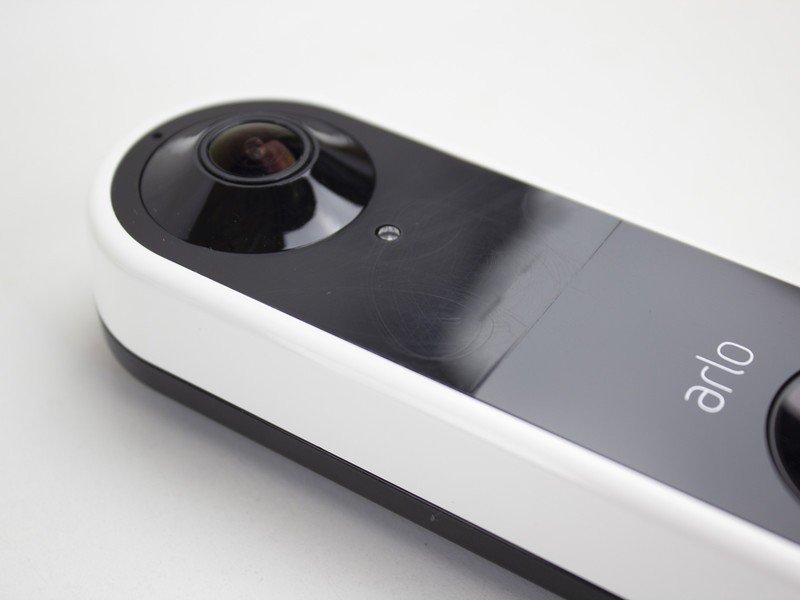
Last and probably least is the shiny plastic used on the front of the Arlo Video Doorbell. Before I even installed the doorbell, I found that I had scratched up the front, and it wasn't inconspicuous either. While you're not likely to be closely inspecting your doorbell for scratches, I found it irritating that such a shiny, easily scratched plastic was used at all on the thing. Better stick to matte or another material next time.
The competition
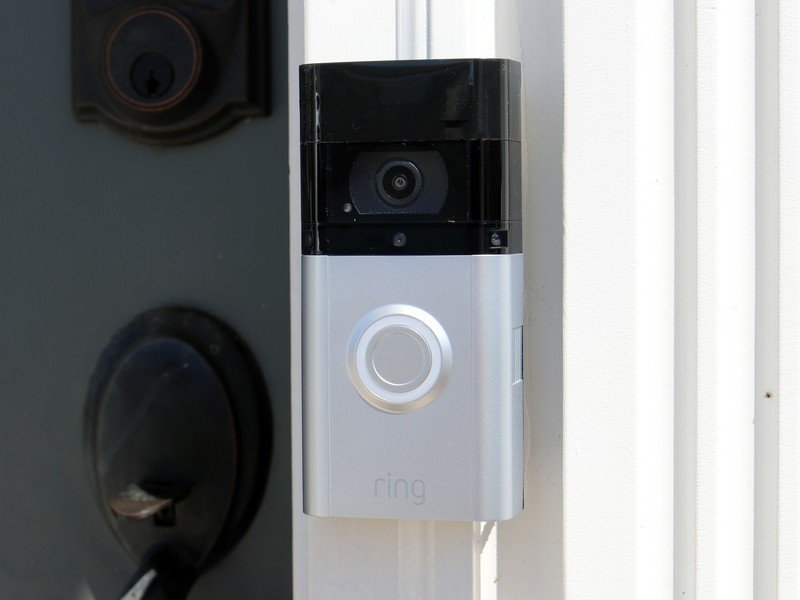
For me, the most obvious competition is the Eufy Security Video Doorbell 2K, which retails for $160 and packs in many of Arlo's best features. 2K HDR video and AI-based motion alerts to differentiate between people and something else are the highlights of the shared features. Eufy also offers local video storage on the doorbell itself and doesn't put advanced motion detection behind a subscription. The downside? A standard aspect ratio, people detection that doesn't always get it right, and less-than-stellar integration with smart home ecosystems like Google Assistant.
Nest Hello was the previous champion for best wired video doorbell in our book, but Google's implementation is more expensive up-front and over time. It does have the distinct advantage of Google's incredible AI, which can actually identify familiar faces and alert you when someone you don't know has shown up. That also means people it recognizes can have unique alerts or no alerts at all since they're supposed to be there. On top of that, Google's intelligent algorithms can even let you know when a package was delivered to your door. If advanced features like this make you smile, then Nest Hello is probably still the best doorbell for you.
Ring's ecosystem of products means it has several video doorbells to choose from, but all of these are best kept inside the Ring and Amazon Alexa ecosystems. In general, Ring's hardware isn't as impressive as Arlo's. Still, the pre-roll feature on the battery-powered Ring Video Doorbell 3 Plus makes it act a lot more like a wired video doorbell than any other battery-powered video doorbell on the market. Many of Ring's video doorbells also offer the option of running as a wired doorbell with a battery backup, which is a huge advantage for Ring.
Arlo Video Doorbell: Should you buy
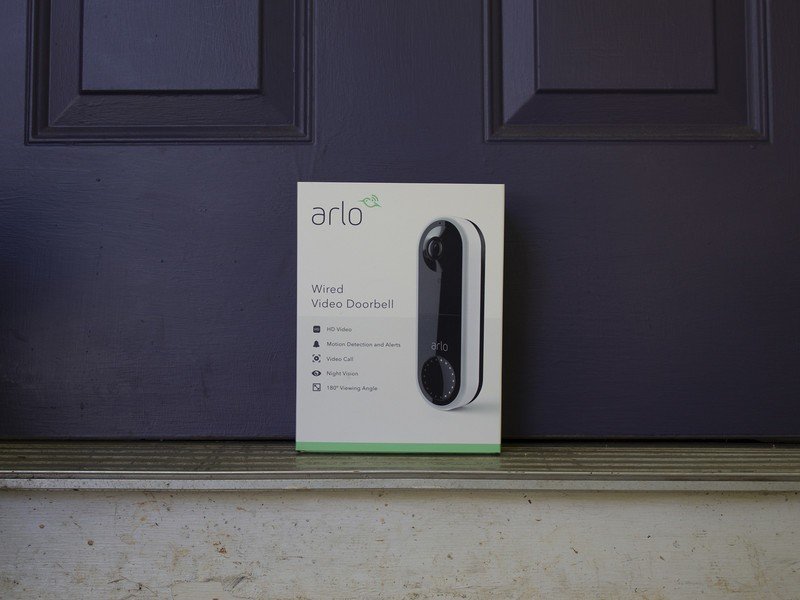
You should buy this if ...
You want the best video quality
As we've seen from every other industry, video quality isn't just about resolution. Features like HDR help better balance out the colors, light and dark areas, and make the overall image clearer than SDR video. Higher-resolution certainly helps, and Arlo's 2K resolution looks great. Still, it's the unique 1:1 aspect ratio combined with the ultra-wide 180-degree angle lens that gives Arlo the biggest advantage over all its competitors. It doesn't just look better; it sees more.
Your privacy is most important
Unlike some other companies, Arlo never shares your personal data for any reason at all. It's becoming increasingly important to choose companies that take your privacy seriously in a world full of surveillance. Arlo's proven track record of consumer information protection gives it a distinct advantage over some other competitors. On top of that, Arlo's AI detection works similarly to Eufy's in that it only identifies objects based on their shape and movement, not via personal identification in any way.
You have a mixed-device household
Whether your significant other is rocking a different brand phone than you, or if you've got a mix of Google Assistant, Amazon Alexa, or Apple HomeKit-compatible products in your home, Arlo will work with them all. While official HomeKit support is still being added throughout Arlo's line of cameras, IFTTT integration ensures you can link everything together without much fuss. Among the most popular brands, it's typically pretty rare to find one that plays well with everyone else, but Arlo does this exceedingly well.
You should not buy this if ...
You need battery operation
The biggest weak point of Arlo's hardware is the complete lack of a battery inside. While this isn't uncommon with wired doorbells, brands like Ring offer battery-powered video doorbells that can also be wired up, giving users the advantage of both types of products. If you want a battery as a backup or just can't wire-up a video doorbell because of where you live, this isn't the doorbell for you.
You don't want to pay for another subscription
The Arlo Video Doorbell doesn't require a subscription to work, but using one without a subscription will only provide the most basic functionality. Without one, you won't have any video storage and won't get the object-based motion detection that helps make the Arlo Video Doorbell special. Video Doorbells like the Eufy Security Video Doorbell 2K offer local storage options with object-based motion detection without a subscription.
You want even more advanced AI detection
Arlo's object-based motion detection specializes in identifying the difference between common motion events, like people and animals, but it doesn't attempt to actually identify individuals. Nest Hello can recognize people's individual identities and alert you when it doesn't recognize someone.
Arlo Video Doorbell is the best wired video doorbell for most people. While it requires a subscription to get the most out of it, $3 per month isn't exactly breaking the bank. It's got just enough smarts to identify the difference between people and animals, but not so much that it feels like an invasion of privacy. The unique aspect ratio works best for its function — being on a porch — and the 2K HDR video quality is best in its class. Just make sure you can wire it up; otherwise, this battery-free video doorbell isn't going to be very useful.
4.5 out of 5
Arlo Video Doorbell challenges many common names like Nest and Ring with an affordable, powerful video doorbell that outclasses those brands in almost every category. Arlo went back to the drawing board for its video doorbell design and returned with a fresh idea: change up the aspect ratio so that recording events on a front porch makes more sense. After all, recording 16:9 horizontal video doesn't necessarily make a lot of sense when a subject is up-close and likely standing several feet above where your video doorbell is mounted.
While Arlo requires a subscription to get storage and object-based motion detection, the $3 per month charge is totally worth the extra features you'll get, even if it adds to our modern-day subscription fatigue. What could be improved? Adding in the ability to save to local storage from the doorbell would be really nice, and adding in a battery for more versatility would help things quite a bit.

